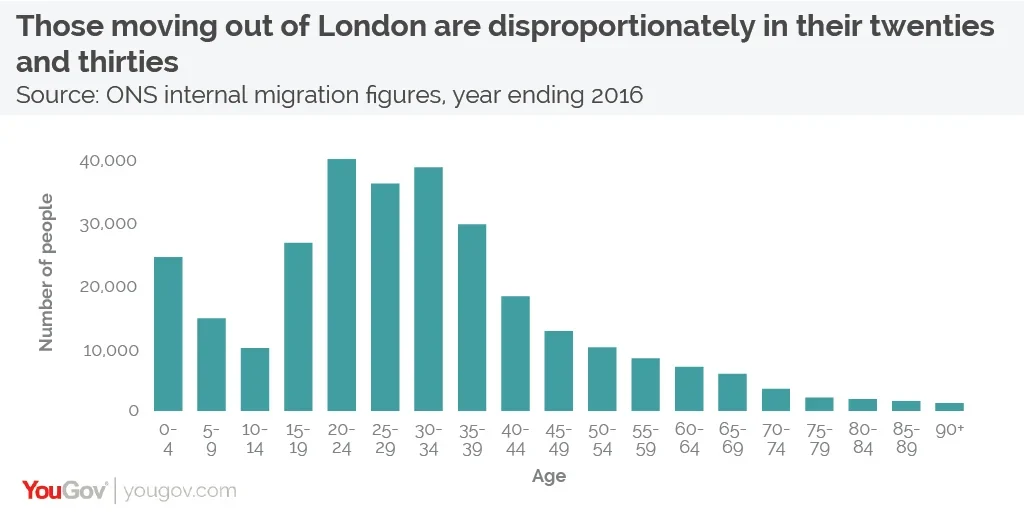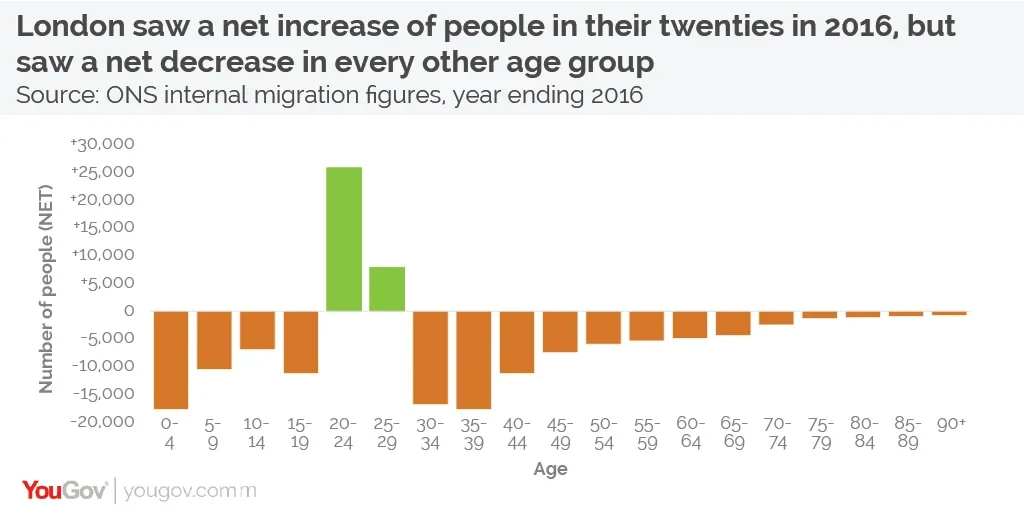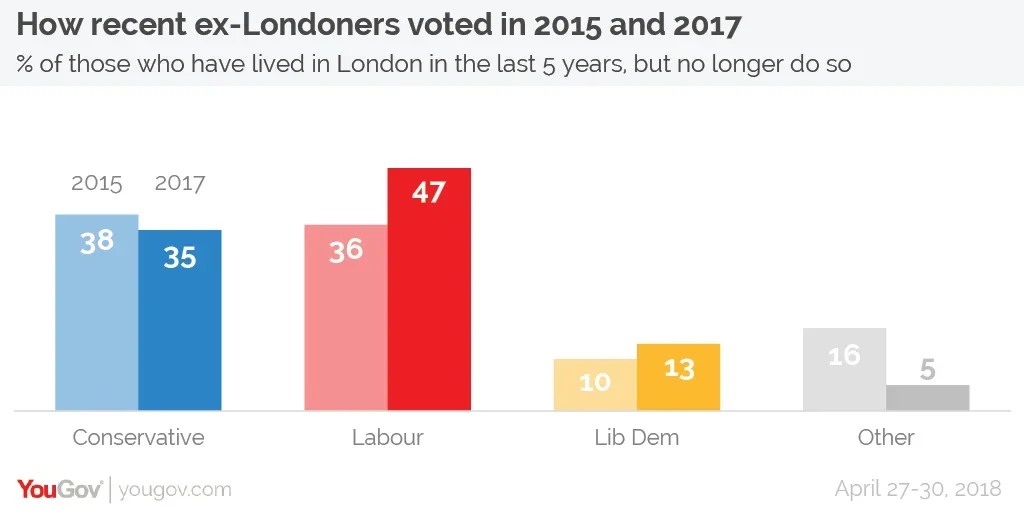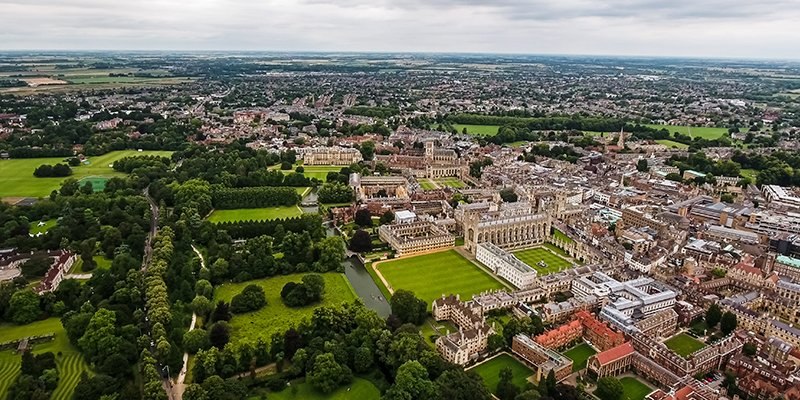The south of England is becoming more like London as young people move out. It’s a timebomb for the Conservatives
This article originally appeared in The Guardian
Last October I explained how demographic changes helped to explain the relatively poor performance of the Conservatives in the south of England in last year’s general election. People leaving London are setting up home across the south in their hundreds of thousands, and as a result changing the composition of both London and the south. Now we at Election Data are examining the demographic trends more deeply, with a poll of ex-Londoners’ voting behaviours.
We know that those who left London in recent years are disproportionately in the earlier stages of their working lives. More than four in 10 (42%) are between the ages of 25 and 44, with nearly a quarter (23%) in their 30s. Data from our polling indicates that 44% of these ex-Londoners have a degree, compared with just 27% of the general population.

Meanwhile, London continues to suck in young students, graduates and twentysomethings from across the country. (Nearly 750,000 people have arrived in the capital over the past four years.) This means a net inflow of these younger, better-educated voters – so London gets younger and younger, while outlying towns, within commuting distance of the capital, see a large influx from London. In effect, London is attracting better-educated young people, who in time are deposited back into commuter-belt towns surrounding the metropolis. The political effects of these significant patterns can be seen in elections since 2015.

Across the south, places including Cambridgeshire, Hertfordshire, Reading, Windsor and Maidenhead, Wokingham, High Wycombe, Winchester, Tunbridge Wells, Oxfordshire, Epsom, Guildford, Cheltenham, Exeter, Brighton, Bristol, Bath and Stroud – many of the destinations of choice for Londoners – voted in 2016 to remain in the European Union.
In the 2017 general election, not only did the Conservatives lose seats in Brighton, Bedford, Canterbury, Ipswich, Stroud, Eastbourne, Peterborough, Reading and Oxford – but many seats across the south saw a swing from the Conservatives to Labour.
Labour saw its vote share increase by over 10% in the south-east and east of England, coming close to winning seats in Milton Keynes, Norwich and Southampton while also improving its performance across the region in seat after seat.
Since the general election there have been more than 600 local byelections in councils across Britain.
In the south of England the Conservatives have been suffering:
- In the south-east the Conservatives have lost 29% of the 79 seats they were defending.
- In the south-west the Conservatives have lost 46% of the 37 seats they were defending.
- In the east of England the Conservatives have lost 42% of the 52 seats they were defending.
In the local elections last week, the Conservatives lost control of Mole Valley, Plymouth, Kingston-upon-Thames, and South Cambridgeshire, while also losing vote share in wards across the region. So at the same time as the development of significant migration patterns, the political makeup of the south has changed. The obvious question is: are the two events related? One way to find out would be to ask those people who have left London how they have voted in recent general elections and the European referendum.
The new poll does just that. We surveyed more than 25,000 voters last weekend – after the local elections – to identify a sample of respondents who have left London in recent years, to find out which parties they supported in the 2015 and 2017 general elections, as well as the 2016 EU referendum. The results are striking. On attitudes to Europe, those who have migrated out of London in the past five years were more likely to have voted remain than those they were leaving behind, breaking 66% remain to 34% leave.
At the 2017 general election, Labour experienced similar swings among these ex-Londoners as it did among those who remained in London, increasing itsvote share by 11% on the previous election among ex-Londoners while the Conservatives’ vote share fell by 3% (a seven-point swing to Labour).
The net result means that Labour held a 12-point lead over the Conservatives among these ex-Londoners in the 2017 general election, with the parties on 47% and 35% retrospectively.

Historically speaking, you might have expected these voters to be much more Conservative. Many can be described as affluent young families with suburban mindsets. Seven in 10 are ABC1 social grade. However, over the last two years they have moved from supporting the Conservatives, then the remain side in the European referendum, and now Labour.
Slowly but surely, parts of the south of England are becoming a little bit more like London. If these trends continue we can expect the south’s political makeup to become more like London too. The results of recent elections bear this out, and this polling shows us why.
Photo: Getty











